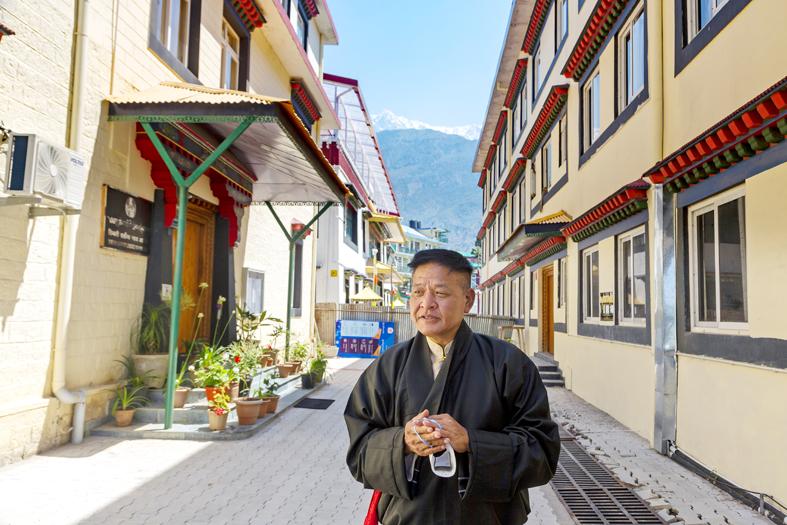The new president of the Tibetan exile government yesterday said that he was willing to reach out to the Chinese government to resolve their conflict, although the sides have not had dialogue in more than a decade.
Penpa Tsering, former speaker of the Tibetan exile parliament, was sworn in as president of the Central Tibetan Administration at a ceremony in Dharmsala, the northern Indian town where Buddhist spiritual leader the Dalai Lama has been living since he fled Tibet after a failed uprising against Chinese rule in 1959.
The Dalai Lama participated virtually in the ceremony from his residence and spoke briefly.

Photo: AP
China denies curbing religion in Tibet and says the Himalayan region governed by the Chinese Communist Party since 1951 has been Chinese territory since the mid-13th century.
Many Tibetans say that they were effectively independent for most of their history and that the Chinese government wants to exploit the resource-rich region, while crushing its cultural identity.
China does not recognize the Central Tibetan Administration and has not held any dialogue with representatives of the Dalai Lama since 2010.
India considers Tibet as part of China, although it hosts the Tibetan exiles.
Penpa Tsering said a Chinese “white paper,” or policy document, issued on Friday last week had nothing new on Tibet.
“All I can say is we are open to send people to verify the facts that they have claimed in the white paper,” he told reporters. “At the same time, we have always been very consistent in our position that we are willing to reach out to the Chinese government to resolve the Sino-Tibetan conflict.”
Beijing accuses the Dalai Lama of seeking to separate Tibet from China, which he denies. Penpa Tsering supports the Dalai Lama’s position.
Some Tibetan groups advocate independence for Tibet, as little progress has been made in talks with China.
The election, which was held in two rounds in January and April, was the third direct election of the Tibetan exile leadership since the Dalai Lama withdrew from any political role in the running of the exile government in 2011.
Nearly 64,000 Tibetans living in exile in India, Nepal, North America, Europe, Australia and elsewhere voted.
Penpa Tsering, 53, was elected to the exile parliament in 1996 and became speaker in 2008. He succeeded Lobsang Sangay, who completed his second five-year term.

A fire caused by a burst gas pipe yesterday spread to several homes and sent a fireball soaring into the sky outside Malaysia’s largest city, injuring more than 100 people. The towering inferno near a gas station in Putra Heights outside Kuala Lumpur was visible for kilometers and lasted for several hours. It happened during a public holiday as Muslims, who are the majority in Malaysia, celebrate the second day of Eid al-Fitr. National oil company Petronas said the fire started at one of its gas pipelines at 8:10am and the affected pipeline was later isolated. Disaster management officials said shutting the

UNREST: The authorities in Turkey arrested 13 Turkish journalists in five days, deported a BBC correspondent and on Thursday arrested a reporter from Sweden Waving flags and chanting slogans, many hundreds of thousands of anti-government demonstrators on Saturday rallied in Istanbul, Turkey, in defence of democracy after the arrest of Istanbul Mayor Ekrem Imamoglu which sparked Turkey’s worst street unrest in more than a decade. Under a cloudless blue sky, vast crowds gathered in Maltepe on the Asian side of Turkey’s biggest city on the eve of the Eid al-Fitr celebration which started yesterday, marking the end of Ramadan. Ozgur Ozel, chairman of the main opposition Republican People’s Party (CHP), which organized the rally, said there were 2.2 million people in the crowd, but

The US government has banned US government personnel in China, as well as family members and contractors with security clearances, from any romantic or sexual relationships with Chinese citizens, The Associated Press (AP) has learned. Four people with direct knowledge of the matter told the AP about the policy, which was put into effect by departing US ambassador Nicholas Burns in January shortly before he left China. The people would speak only on condition of anonymity to discuss details of a confidential directive. Although some US agencies already had strict rules on such relationships, a blanket “nonfraternization” policy, as it is known, has

OPTIONS: Asked if one potential avenue to a third term was having J.D. Vance run for the top job and then pass the baton to him, Trump said: ‘That’s one,’ among others US President Donald Trump on Sunday that “I’m not joking” about trying to serve a third term, the clearest indication he is considering ways to breach a constitutional barrier against continuing to lead the country after his second term ends at the beginning of 2029. “There are methods which you could do it,” Trump said in a telephone interview with NBC News from Mar-a-Lago, his private club. He elaborated later to reporters on Air Force One from Florida to Washington that “I have had more people ask me to have a third term, which in a way is a fourth term